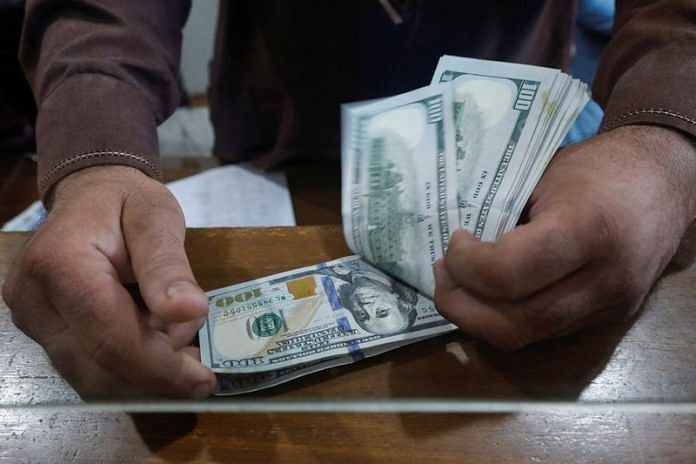By Harry Robertson and Tom Westbrook
LONDON/SINGAPORE (Reuters) -The dollar found a footing on Thursday after falling sharply on Wednesday on the back of data showing a slowdown in U.S. inflation, while Japan’s yen inched higher after jumping the previous day.
U.S. inflation slowed to 0.3% in April from a month earlier, down from 0.4% in March and below expectations for another 0.4% reading, Wednesday’s data showed.
Year-on-year core inflation – which strips out volatile food and energy prices – fell to its lowest in three years at 3.6%. Meanwhile, retail sales were flat, suggesting conditions for Federal Reserve interest rate cuts are falling into place.
The dollar index, which tracks the currency against six major peers, was last up 0.22% at 104.43 on Thursday after falling 0.75% on Wednesday as investors raised their bets on Fed rate cuts, now envisaging two reductions by the end of the year.
Some analysts said Fed officials will want to see proof of inflation’s downward path before countenancing cuts, a point made by Minneapolis Fed President Neel Kashkari on Wednesday.
Francesco Pesole, FX strategist at ING, said: “In practice there isn’t all that much to be all that optimistic about. Inflation is moving in the right direction but still not at levels that would allow the Fed to cut rates.”
Pesole said investors were now waiting for U.S. personal consumption expenditures inflation data in late May. “My view at this stage is that we could just default to another couple of weeks of low volatility, lack of direction, and range-bound trading.”
The dollar dropped 1% against the yen on Wednesday after the data and was down a further 0.11% on Thursday at 154.74, having fallen as low as 153.6 before weak Japanese growth figures dented the yen.
The Japanese currency has fallen around 9.5% this year as the Bank of Japan has kept monetary policy loose while higher Fed interest rates have drawn money towards U.S. bonds and the dollar. The yen has been particularly sensitive to any widening or closing of the interest rate differential.
The euro hit a two-month high at $1.0895 on Thursday before dipping to trade 0.1% lower at $1.0871. Britain’s pound reached a one-month top of $1.2675 before falling back slightly.
The Australian dollar, which surged 1% on Wednesday, hit a four-month high at $0.6714 but then paused after an unexpected rise in Australian unemployment.
It was last at $0.6676 as traders priced out any risk of a further rate hike in Australia.
Bitcoin touched a three-week high of $66,695 before dipping slightly.
(Reporting by Harry Robertson in London and Tom Westbrook in Singapore; Editing by Tom Hogue, Mark Potter, Alexandra Hudson)
Disclaimer: This report is auto generated from the Reuters news service. ThePrint holds no responsibilty for its content.



